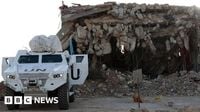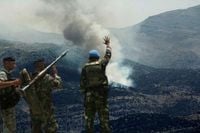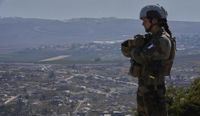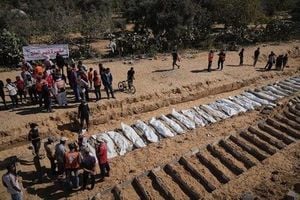The already volatile border between Israel and Lebanon saw a dramatic escalation on Sunday, October 26, 2025, when United Nations peacekeepers shot down an Israeli drone near the southeastern Lebanese town of Kfar Kila. The rare defensive action by the United Nations Interim Force in Lebanon (UNIFIL) has triggered a new wave of conflicting narratives, diplomatic tension, and concern over the fragile ceasefire that has held—albeit shakily—since last year’s war between Israel and Hezbollah.
According to a statement released by UNIFIL and reported by BBC, the incident unfolded as a UN patrol was operating near Kfar Kila. Peacekeepers observed an Israeli drone flying in what they described as an “aggressive manner.” In response, they “applied necessary defensive countermeasures to neutralize the drone.” The Israeli military, however, offered a starkly different account. Spokesman Lt Col Nadav Shoshani posted on X (formerly Twitter) that the drone was merely conducting “routine intelligence-gathering activity” and “did not pose a threat to UNIFIL forces.” He added, “An initial inquiry suggests that UNIFIL forces stationed nearby deliberately fired at the drone and downed it.”
As the dust settled from the drone’s downing, the situation quickly escalated. UNIFIL stated that shortly after the drone was shot down, another Israeli drone dropped a grenade near the peacekeeping patrol. Moments later, an Israeli tank fired a shot in the direction of the peacekeepers. Miraculously, no injuries or damage were reported among the UN personnel or their vehicles. The Israeli military confirmed that a grenade was dropped toward the area where the drone fell, but emphasized, “No fire was directed at UNIFIL forces. The incident is being further reviewed through military coordination channels.”
While such confrontations are rare, they are not entirely unprecedented. The last known incident of UNIFIL neutralizing an Israeli drone occurred in October 2024, when a German naval vessel participating in the peacekeeping mission intercepted a drone off the Lebanese coast during the height of the Israel-Hezbollah conflict. Still, Sunday’s downing marks a significant moment, coming at a time when the region is already on edge amid ongoing skirmishes and diplomatic maneuvering.
The broader context is tense and complicated. The current ceasefire—brokered in November 2024—ended a brutal round of fighting between Israel and Hezbollah, the powerful Lebanese militant group. Under the terms of the ceasefire, Israeli troops were to withdraw from southern Lebanon, while Hezbollah was required to move its fighters north of the Litani River and dismantle its military infrastructure there. However, as BBC noted, Hezbollah and its allies have strongly opposed these provisions, and the group has refused to disarm despite mounting pressure from both the Lebanese army and the international community.
For its part, Israel has continued to conduct drone flights and air strikes in Lebanon, targeting what it says are Hezbollah operatives and infrastructure. The Israeli military claims these operations are necessary to prevent Hezbollah from regrouping and rearming. According to Israeli figures cited by international outlets, more than 330 Hezbollah members have been killed and hundreds of targets struck since the ceasefire took effect. The United Nations and the Lebanese government, however, have repeatedly condemned these Israeli actions as violations of Lebanese sovereignty and breaches of the ceasefire agreement.
Sunday’s incident comes as a flurry of diplomatic activity seeks to stabilize the border and revive the truce. A new meeting of the US and French-led ceasefire monitoring mechanism, now chaired by Gen Joseph Clearfield and attended by US envoy Morgan Ortagus, is expected to take place in the coming days. Additionally, the Arab League’s Secretary-General Ahmed Aboul Gheit and Egyptian intelligence chief Hassan Rashad are scheduled to visit Lebanon, while US envoy Tom Barrack is due to return to Beirut ahead of the arrival of incoming US Ambassador Michel Issa. These efforts underscore the international community’s deep concern about the possibility of renewed conflict and the urgent need for a sustainable peace.
UNIFIL’s role in this delicate balance cannot be overstated. Established in 1978 to oversee the withdrawal of Israeli troops after that year’s invasion of southern Lebanon, the peacekeeping force’s mandate was expanded following the 2006 war between Israel and Hezbollah. UNIFIL has since been a constant presence along the border, tasked with monitoring hostilities, facilitating humanitarian access, and supporting the Lebanese armed forces. Earlier this year, the UN Security Council voted to end UNIFIL’s mandate as of December 31, 2026, at which point the force will have a year to wind down its mission and withdraw its personnel.
The peacekeeping force’s presence is crucial, as only the Lebanese army and UNIFIL are authorized to deploy armed personnel in the area south of the Litani River. Despite this, Israel has maintained positions at several strategic border sites and has stepped up its military activities in recent weeks. The Lebanese army has put forward a plan to disarm Hezbollah, but whether this initiative can succeed remains an open question. Hezbollah, weakened by the recent conflict and facing both domestic and international pressure, has so far refused to surrender its weapons.
The situation is further complicated by the ongoing war in Gaza, which erupted following the Hamas-led attack on Israel on October 7, 2023. Hezbollah, which is closely aligned with Hamas, began firing rockets into Israel in support of the Palestinian group, triggering a new round of violence along the Israel-Lebanon border. Since then, both sides have accused each other of repeated violations of the ceasefire, and the risk of a wider regional conflict has remained ever-present.
Sunday’s drone incident is, in many ways, emblematic of the deep mistrust and volatility that continue to define the border region. While both Israel and UNIFIL insist that their actions were defensive in nature, the conflicting accounts highlight the difficulty of maintaining peace in an environment where every move is scrutinized and every misstep could spark a broader confrontation. As one UNIFIL statement put it, “Fortunately, no injury or damage was caused to the UNIFIL peacekeepers and assets.” But the underlying tensions remain unresolved, and the coming weeks—marked by diplomatic summits and high-stakes negotiations—will be critical in determining whether the ceasefire can hold.
For now, the border between Israel and Lebanon remains a powder keg. With international diplomats converging on Beirut and peacekeepers on high alert, the world watches anxiously, hoping that the latest drone incident will not be the spark that ignites a new conflict in a region already scarred by decades of war.






